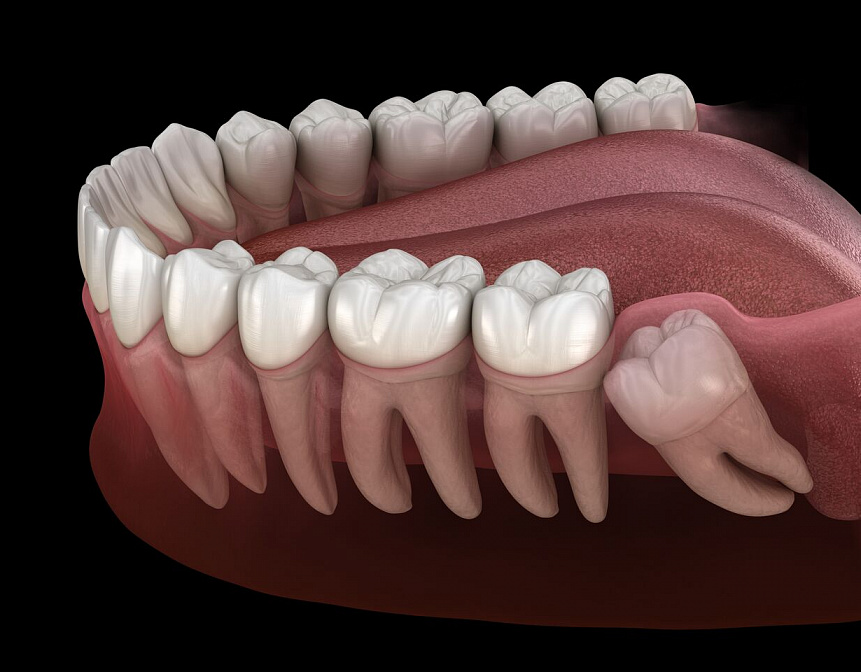Wisdom Teeth: Should They Be Removed or Treated?

Wisdom teeth, also known as "third molars," often raise questions among patients. These final molars can cause various problems, leading many to wonder whether they should be removed or treated. To better understand whether it's necessary to remove wisdom teeth or attempt to save them, let's explore their characteristics and risks.
Why Do We Have Wisdom Teeth?
It is believed that wisdom teeth are an evolutionary relic. In ancient times, humans needed powerful jaws to chew tough, raw food like meat. As human diets evolved, the need for wisdom teeth disappeared. Today, they don't play an important role in chewing, especially if their opposite counterparts haven't erupted.
Characteristics of Wisdom Teeth
Wisdom teeth appear much later than other teeth. They typically begin forming between ages 4-6 and erupt in adulthood, usually between 18 and 27 years old. However, in some individuals, they may appear after the age of 30 or not erupt at all.
In some cases, wisdom teeth may not fully erupt and remain under the gums—these are known as impacted wisdom teeth. In other cases, they may grow at an incorrect angle, known as misaligned or tilted wisdom teeth, which can cause pressure or damage to neighboring teeth.
Are Wisdom Teeth Useful?
Wisdom teeth are often susceptible to decay due to the difficulty in cleaning them. Bacteria and food particles can accumulate on and under the gums, leading to inflammation and pain. Wisdom teeth can be treated only if they serve as a support for dental prosthetics or if the decay is minimal and has not reached the root canals.
In most cases, dentists recommend the removal of wisdom teeth, especially if they cause discomfort, are decayed, or interfere with other teeth.
When Should Wisdom Teeth Be Removed?
Wisdom teeth removal is recommended in the following cases:
- Decay complicated by pulpitis.
- Severe tooth destruction.
- Inflammation of the gums or surrounding tissues.
- Misaligned wisdom teeth that damage adjacent teeth or the soft tissues.
- Impacted wisdom teeth with inflamed gum "hood."
- Risk of developing periostitis or osteomyelitis of the jaw.
Wisdom teeth may also need to be removed during orthodontic treatment or in preparation for dental implants if they interfere with crown placement or pose an infection risk.
How Are Wisdom Teeth Removed?
Before removal, a thorough diagnosis is performed, including an X-ray or CT scan, to determine the position and condition of the wisdom teeth's roots. Removal is done under local anesthesia, and the procedure can be either simple or complex depending on the tooth's location and condition:
- Simple Removal. If the tooth has erupted correctly and its roots are not complex, the procedure typically takes only 10-20 minutes.
- Complex Removal. If the tooth is deeply embedded or has branched roots, the procedure may take up to 1-1.5 hours. In this case, the tooth may need to be divided into parts for safe extraction.
- Removal of Impacted Wisdom Teeth. The surgeon makes incisions in the gums and carefully removes the tooth in parts.
Post-Surgery Recommendations for Wisdom Tooth Removal
After the operation, it is important to follow your dentist's recommendations to avoid complications:
- Avoid eating for 3 hours after the surgery.
- Only consume warm liquids and soft foods during the first 24 hours.
- Avoid smoking, alcohol, physical exertion, and hot baths for 5 days.
- Brush your teeth 12 hours after the surgery, carefully avoiding the affected area.
- Do not rinse your mouth during the first 24 hours to prevent dislodging the blood clot from the socket.
Following these recommendations will accelerate healing and minimize the risk of complications.
Preventing Issues with Wisdom Teeth
To avoid problems with wisdom teeth, it is essential to maintain good oral hygiene:
- Brush your teeth twice a day, paying special attention to the "wisdom teeth" area.
- Visit your dentist for professional teeth cleaning every 6 months.
- At the first sign of pain or discomfort, contact your dentist immediately.

